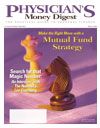Publication
Article
Physician's Money Digest
Dr. Fish and Her 5-year Retirement Plan
Author(s):
Dr. Isabel Fish, who haspracticed psychiatry fornearly 20 years in SouthFlorida, has recentlyturned 55 and is divorcedwith no children. Her income in2005 was approximately $160,000.She currently employs no full-timeemployees in her practice.
Recently, Dr. Fish was recommendedto me by her CPA. She was seekingadvice on establishing a retirementplan, which she would be willing tofund aggressively, because she wouldlike to retire in the next 5 to 7 years. Infact, she would be willing to put awayher entire annual salary if possible. Shelives somewhat modestly and, likeeveryone else, is concerned with minimizingtaxes, adequately funding retirement,protecting monies from creditors,and earning a competitive rate ofreturn on her investments.
Strategies Available
A Simplified Employee Pension IRAcame to mind as a possible retirementplan, which would allow Dr. Fish todefer, depending on the plan chosen, upto $44,000 annually and an additionalcatchup $5000, since she will be overage 50 in 2006. Now, if Dr. Fish desiresto retire in 5 years, deferring $49,000annually for tax purposes is not goingto have much of an impact on retirementincome. Even if her account generateda 7% annualized rate of return,her nest egg is only going to amount toa little more than $290,000 in 5 years.These numbers, at least from my perspective,do not excite me enough towant to go through the trouble ofestablishing such a plan.
Instead, I suggested a defined benefitplan, an employer-sponsored retirementplan in which benefits are based on anactuarial formula that indicates the exactbenefit she could expect upon retiring.The annual contribution is based on currentage, compensation, and time horizonrelative to retirement. Because of herage and proximity to retirement, adefined benefit plan would allow Dr. Fishto make a much larger contributionannually on a tax-favored basis.
My third-party administrator informedme that Dr. Fish could contributeapproximately $167,000 annually tosuch a plan, provided her W2 salary is atleast $152,000. Because the IRS allowsfor lower imputed rates of return (generallyin the range of 5% to 6% annually),Dr. Fish's defined benefit plan couldaccumulate nearly $925,000 in 5 years,based on a 5% annual rate of return.
Time Marching Forward
If Dr. Fish were only 35 instead of55, such a plan would probably giveher no greater annual contribution thanwhat she would be allowed under anormal defined contribution 401(k)pension and profit-sharing plan. If youare a physician in your 50s with lessthan 10 years until retirement, adefined benefit plan can be a greatopportunity for you to build a considerablenest egg.
Are there any drawbacks to definedbenefit plans? The IRS does not allowthe plan sponsor to discriminate; therefore,it must include all eligible employeesin such a plan. If Dr. Fish hademployees who were close to the sameage as herself, she would have to funda benefit for them as well, which wouldbecome increasingly expensive as theeligible plan participants grow older.Second, these types of plans must bekept viable for no less than 5 years, andthe annual contributions to such plansshould be kept relatively consistent.Where trouble generally arises withthese plans is when the plan sponsor isseeking to shelter a lot of income becausethey may have had an extraordinarilyprofitable year, and may notintend on making similar contributionsover the forthcoming few years.
Thomas R. Koskyand his partner, Harris L.
Kerker, are principals of the Asset Planning,
Group, Inc, in Miami, Fla. The company
specializes in investment, retirement, and
estate planning. Mr. Kosky also teaches corporate
finance in the Saturday Executive and Health Care
Executive MBA Programs at the University of Miami in Coral
Gables, Fla. Mr. Kosky and Mr. Kerker welcome questions or
comments at 800-953-5508 or e-mail Mr. Kosky directly at
ProfessorKosky@aol.com.
